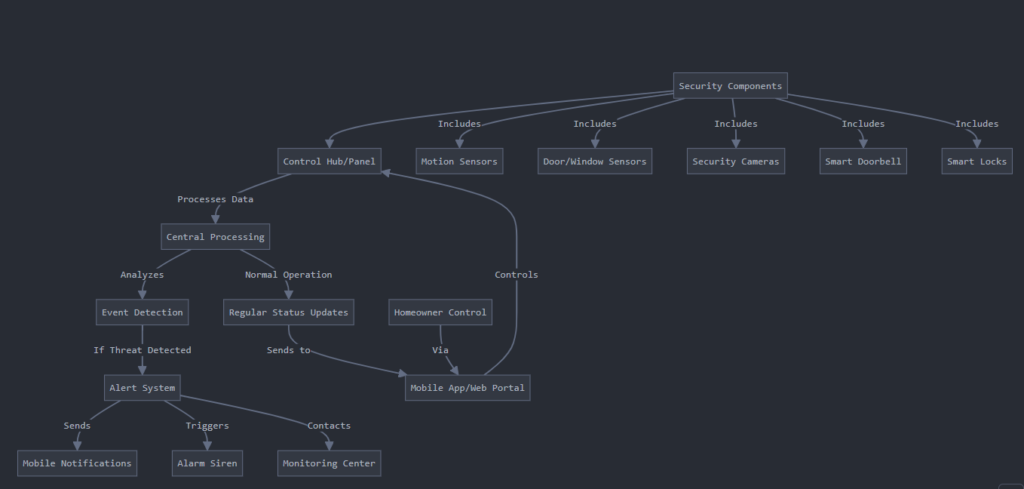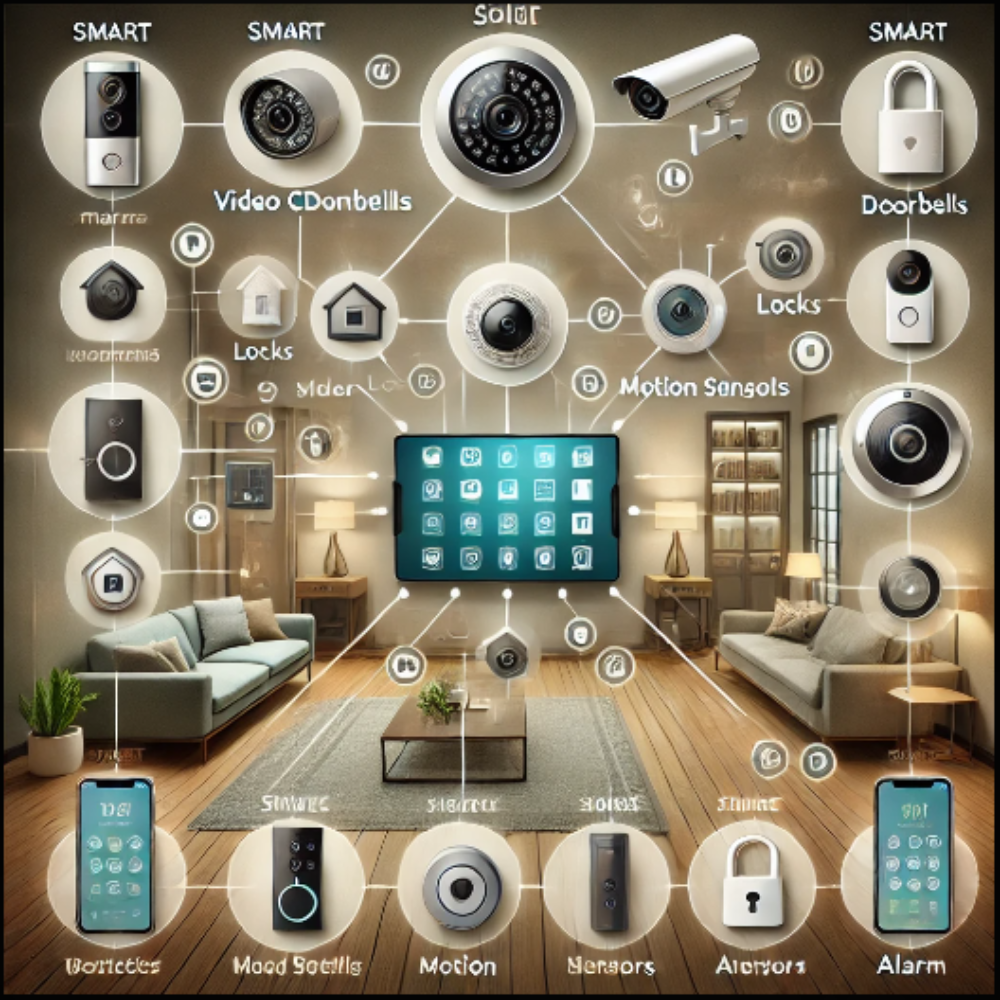As a home security expert, I believe smart home security systems are essential for modern safety. They offer flexibility and control that traditional systems can not match. The ability to monitor my home in real time and receive instant alerts makes it easier to respond to potential threats. Smart devices can integrate seamlessly, allowing for automation that enhances security, like automatically locking doors at night.
What Is Smart Home Security System?

Smart Security System in Home is an integrated security solution that combines hardware devices and software applications to provide 24/7 automated surveillance, intrusion detection, and remote access control, enabling homeowners to monitor their property in real time via mobile apps and receive instant alerts about potential security threats.”
Contemporary examples and data:
- Ring and Arlo reported over 40 million smart doorbell installations globally in 2023
- 63% of US households use at least one smart security device (Consumer Technology Association, 2023)
- Popular systems: Ring Alarm Pro, Simplisafe, ADT, Google Nest Secure
- Features: Facial recognition, package detection, two-way audio, cloud storage, and integration with voice assistants
How Smart Home Security Systems Work?
A home security system operates as an integrated network of smart devices working seamlessly together to protect your property.
At its core, sensors and cameras constantly monitor your home, detecting any unusual activity like motion, door/window openings, or unexpected presence.
This information flows to a central control hub that acts as the system’s brain, instantly processing data to determine if there’s a potential threat.

When the system detects suspicious activity, it immediately triggers a response – sending real-time alerts to your smartphone, activating sirens if enabled, and notifying professional monitoring centers if you have a monitored service.
You maintain complete control through a mobile app, allowing you to arm/disarm the system, view live camera feeds, or adjust settings from anywhere. The entire process is automated, requiring minimal intervention while providing round-the-clock protection for your home.
What is the best of home security?
The best of home security is a layered approach that combines modern technology with traditional safety measures.
A comprehensive system typically starts with a professionally monitored security setup featuring AI-powered cameras, smart doorbells, and multiple sensors, all connected to a 24/7 monitoring center for immediate response to threats.
This core system should be complemented by fundamental security measures like high-quality door locks, window security, and motion-activated lighting. The effectiveness is maximized when these technical solutions are paired with good security habits, such as consistent system arming, regular maintenance checks, and active participation in neighborhood watch programs.
While professional systems with smart integration (costing around $40-60 monthly plus equipment) generally provide the most robust protection, the truly best security solution is one that fits your lifestyle, budget, and property needs while being user-friendly
Enough to encourage regular daily use. Whether choosing a professional system like ADT or a sophisticated DIY option like Ring, the key is maintaining multiple layers of security that work together seamlessly to protect your home.
Types of smart home security systems

Main types of smart home security systems:
DIY Smart Security Systems
DIY smart security systems are self-installed and self-monitored, offering a flexible and cost-effective solution for homeowners. Brands like Ring, SimpliSafe, and Arlo are popular choices, each providing unique features to suit various security needs. These systems typically have an initial cost ranging from $200 to $500, with optional monthly fees for premium services like cloud storage or professional monitoring.
Professional Security Systems
Professional security systems, such as those offered by ADT, Vivint, and Brinks, are designed for homeowners seeking comprehensive protection with expert installation and monitoring. These systems typically cost between $500 and $1500 for initial setup, with ongoing monthly fees ranging from $30 to $60 for continuous professional monitoring and support.
These systems feature advanced equipment like high-definition cameras, smart sensors, and motion detectors, along with integrations for home automation. Professional installation ensures optimal setup, while 24/7 monitoring offers peace of mind, with experts ready to respond to alarms, dispatch emergency services, and monitor your system for any issues. Professional security systems are ideal for those who prefer a hands-off, fully managed solution with enhanced reliability and service.
Wireless Security Systems
Wireless security systems are a popular choice for homeowners and renters alike, as they require no hardwiring, making them easy to install and relocate. These systems typically feature battery-powered sensors that communicate through WiFi or cellular connections, providing flexibility and convenience.
Wireless systems are ideal for renters, as they can be easily set up without causing damage to walls or violating rental agreements. The absence of cables not only simplifies installation but also allows for seamless mobility if you move. They offer essential features like door/window sensors, motion detectors, and cameras, often with mobile alerts for real-time monitoring. These systems provide a reliable, flexible, and low-maintenance security solution that’s perfect for those who value ease of use and portability.
Hardwired Systems
Hardwired security systems are permanently installed, offering a more reliable connection for continuous surveillance. These systems are connected directly to your home’s electrical system, ensuring stable and consistent performance without the concerns of battery life or wireless interference.
One of the main advantages of hardwired systems is their power backup options, such as battery-powered units or generators, ensuring the system remains operational during power outages. Due to their permanent installation and robust reliability, hardwired systems are best suited for homeowners who want a long-term, dependable security solution. While installation may require professional assistance and more upfront costs, the added reliability and durability make them an ideal choice for those seeking comprehensive, uninterrupted protection.
Hybrid Systems
Hybrid security systems combine the best features of both wired and wireless systems, offering customizable components for a flexible and adaptable installation. This versatility makes hybrid systems the most adaptable option, allowing homeowners to choose the perfect balance between reliable hardwired connections and the ease of wireless components.
These systems provide mobile app control, smart home integration, video monitoring, and custom alerts, just like fully wireless or professional systems. Whether you’re looking for advanced features, or simply want to mix and match wired and wireless devices, hybrid systems can be tailored to meet your specific needs.
When choosing a system, it’s important to consider factors such as property type, budget, technical expertise, desired features, and long-term plans. Hybrid systems are ideal for those seeking a flexible, customizable solution that combines the reliability of wired components with the convenience of wireless technology.
Benefits of installing a Home Security System
Here’s a mass explanation of the benefits of installing a home security system:
Enhanced Safety
- – 24/7 protection for family members, especially children and elderly
- – Immediate alerts of smoke, carbon monoxide, or water leaks
- – Remote monitoring while at work or traveling
- – Emergency response coordination during crises
- – Medical alert features for vulnerable family members
- – Statistics: Homes with security systems are 300% less likely to be burglarized (FBI data)
Crime Deterrence
– Visible cameras and security signs deter 60% of potential burglars
– Real-time monitoring prevents “crime of opportunity”
– Video evidence helps in criminal investigations
– Motion-activated lights and cameras scare off intruders
– Automated responses (sirens, lights) during suspicious activity
– Direct communication with authorities during emergencies
Insurance Benefits
– Average 10-20% discount on home insurance premiums
– Additional savings with smart water leak detection
– Lower liability risks
– Better coverage terms
– Documentation for insurance claims
– Typical annual savings: $100-300
Peace of Mind
– Real-time mobile alerts and video feeds
– Remote monitoring of children arriving home
– Package delivery confirmation
– Pet monitoring while away
– Vacation home surveillance
– Elderly parent check-ins
Additional Benefits:
– Smart home integration
– Energy management
– Environmental monitoring
– Fire prevention
– Access control
– Video history storage
Return on Investment:
– Reduced insurance costs
– Protected valuables
– Prevented damage costs
– Energy savings
– Increased home value
These benefits make home security systems a valuable investment for any homeowner or renter.
Conclusion
Modern home security systems represent a crucial investment in both family safety and property protection. By combining advanced technology with professional monitoring, these systems offer unprecedented peace of mind through 24/7 protection, instant alerts, and smart automation.
They not only deter crime and provide valuable evidence when needed but also offer practical benefits like insurance discounts and remote home management. The integration of smart features transforms basic security into a comprehensive home management solution, making daily life both safer and more convenient.
Key Takeaways:
- – 300% reduced burglary risk
- – 10-20% insurance savings
- – Real-time monitoring capabilities
- – Smart home convenience
- – Emergency response coordination
A home security system isn’t just an option – it’s an essential tool for protecting what matters most. The combination of enhanced safety, financial benefits, and peace of mind makes it a worthwhile investment for any household. Whether choosing a professional or DIY solution, the key is selecting a system that fits your lifestyle while providing reliable, round-the-clock protection.
FAQ | Common Questions of Smart Home Security System
Can I view my home security system remotely through Wi-Fi?
Yes, most smart security systems allow remote monitoring via Wi-Fi through a smartphone app.
Why do we need a home security system?
Home security systems deter crime, provide real-time alerts, and offer peace of mind by safeguarding your property and loved ones.
What’s included in a home security system?
Typically, it includes cameras, motion detectors, door/window sensors, and smart locks, often controlled via a mobile app or hub.
Can security systems be hacked?
Yes, though rare, smart security systems can be vulnerable to hacking. Using strong passwords and secure networks reduces risks.
